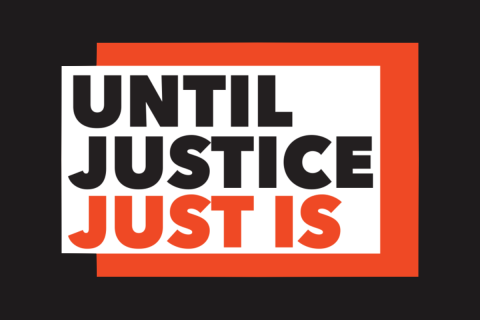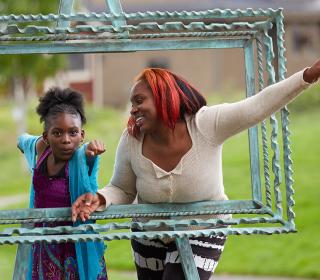Until Justice Just Is (previously known as Stand Against Racism) is an annual YWCA event dedicated to building more effective social justice habits, particularly those dealing with issues of race, power, privilege, and leadership. The conversations we have and the resources we share foster personal reflection, encourage social responsibility, and motivate participants to identify and act on ways to dismantle racism and other forms of discrimination.
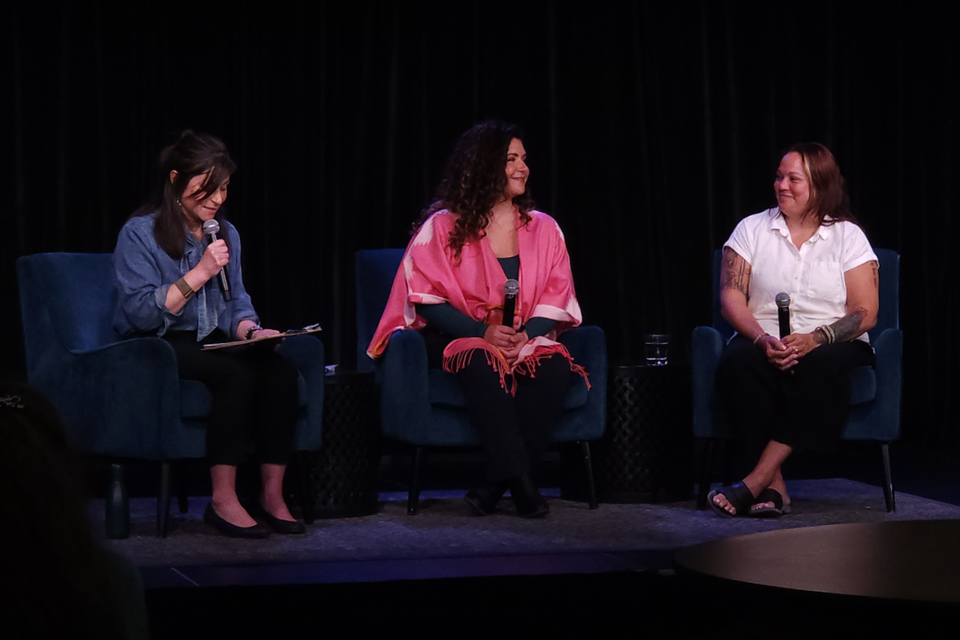
This year, our theme was Immigration Myths vs. Facts. During our panel discussion, led by Caedmon Magboo Cahill (ACLU of Washington) at Town Hall Seattle, our panelists and long-term immigration advocates Jennyfer Mesa (Latinos En Spokane) and Dannie Nemes (API Chaya) talked about the history of immigration on a local and national level and how recent changes, and myths about immigrants, are negatively impacting our communities.
Myths justifying racist policies
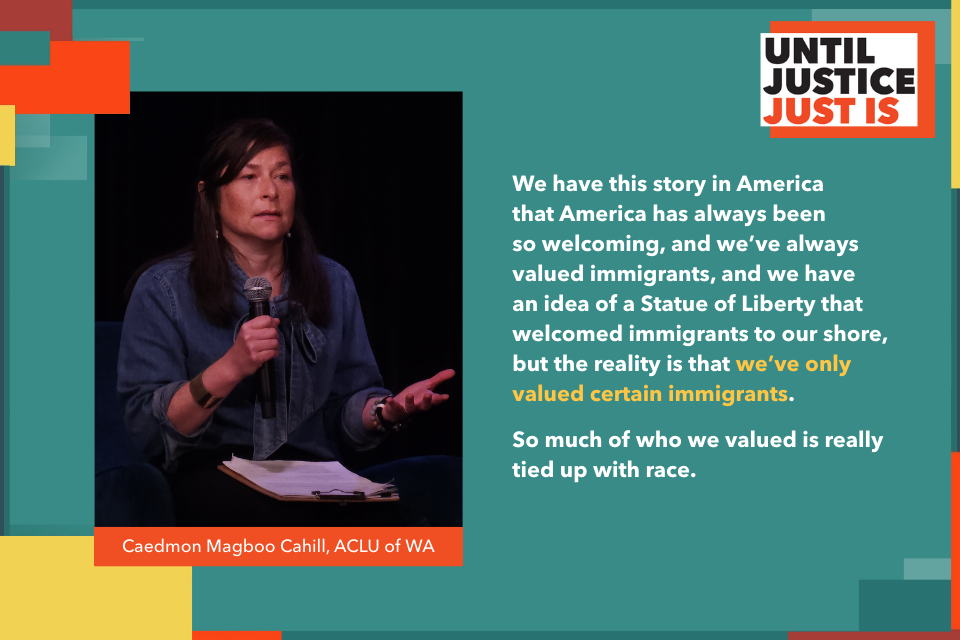
These words from our moderator Caedmon set the tone for our conversation about the history of immigration in the United States. Caedmon highlighted three specific immigration policies that shape many of our modern-day immigration policies, deportation raids, and the militarization of our borders:
- The Chinese Exclusion Act of 1882 – This was the first Federal Law that restricted immigration explicitly based on race. It provided a 10 year ban on Chinese laborers immigrating to the US due to Chinese labor being seen as an economic threat to white labor.
- President Eisenhower’s Operation Wetback (1955) – The brutal mass deportation of as many as 1.3 million Mexicans and people of Mexican descent (an estimated 60% of whom were US citizens) due to fear of immigrant labor displacing white labor.
- The Alien Enemies Act (1798) – A wartime authority that allows the president to detain or deport the natives and citizens of an enemy nation, based only on their country of birth or citizenship, without due process. This act was used to justify the incarceration of approximately 120,000 women, men, and children of Japanese ancestry in 1942.
All these policies had significant support from the American public at the time because the damning tool of public narratives — narratives based on lies, deception, moral panic, xenophobic fear-mongering and racist tropes — which made these policies feel justified and necessary to “keep us safe” (though not everyone is included in that “us”). By instilling fear in communities, miscasting immigrants as violent criminals, leveraging racist ideologies, and ramping up a language of invasion, racist policies were allowed to destroy the lives of millions.
Policy Impacts
Jennyfer and Dannie shared their perspective and experiences from their personal and professional lives dealing with the long-term and short-term effects of these racist policies and persistent myths about immigration.
“As immigrants, this isn’t the first time we’ve had this sort of experience of mass-deportation. [...] We’ve seen this rollercoaster of, ‘We belong, now we don’t belong. You can come here under these certain statuses, but these don’t count.’ Because we are grouped into these different statuses, some [people] belong more than others,” said Jennyfer. She explained how because of current policies in our government, there is an increasing “invisible presence” of immigrants in our communities. “They’re not going to reach out for resources, they’re not going to reach out for help in the fear of being targeted. And right now, we’re all being targeted, but there’s certain groups that are being targeted more.”
Although this experience isn’t new to many immigrants or advocates, Jennyfer notes that the aggressive execution of these policies is. “I’ve seen more deportations take place since inauguration than what I had in the last 4 years. People are disappearing, people are being targeted, and those that are here with documentation are also being targeted in that they’re not able to ask for their pay, ask for help with the police, [or] go to the hospitals, because now those rights of having sanctuary spaces have been stripped away.”
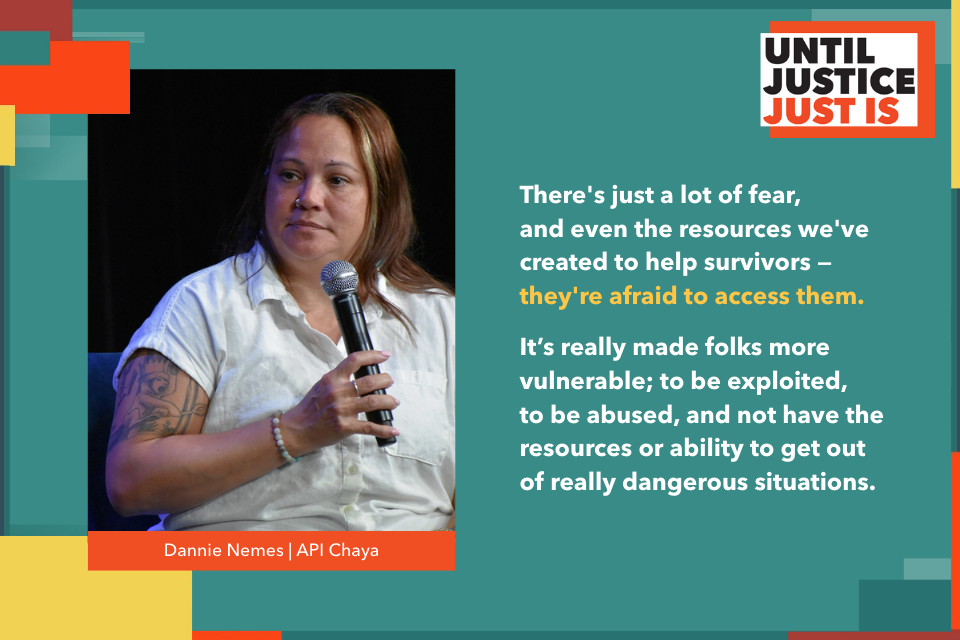
The loss of sanctuary spaces isn’t the only problem; people are afraid to enter federal buildings, libraries, schools, or access the resources available to them for fear of being arrested or abducted by Federal agents, and it puts these individuals even more at risk. The way Dannie sees it, “There’s just a lot of fear, and even the resources we've created to help survivors — they're afraid to access them. It’s really made folks more vulnerable; to be exploited, to be abused, and not have the resources or ability to get out of really dangerous situations.”
Dannie shared the story of one of her clients to convey just how damaging this fear has been to families. “Just a couple months ago, I had this heartbreaking situation where the 13 year old daughter of one of my clients had to go to immigration court by herself because it was too risky for her mother to be there with her. [...] That weight that she had to experience, being alone and not having her mother by her side was just terrible.”
Jennyfer shared a story about people contacting her and Latinos En Spokane to file police reports for friends and family members who have vanished without a trace. "When people are taken, ICE and Border Patrol can sometimes hold them up to 72 hours. Even if they're young minors. 72 hours, they are not even registered, and you don't know where your loved one is, you don't know if they're still in Spokane or if they're in Tacoma or if they're being deported. [...] It is so alarming that we have to wait so long, I mean, just think about the pain, the worry that this can cause families, and just people in general." Although ICE says it doesn't typically detain unaccompanied minors, history has shown time and time again that even children aren't safe from the fickle whims of federal agencies who don't always follow the law.
How you can make a difference
Our speakers emphasized that this is not just an immigrant issue, this is an EVERYONE issue. We need to inform each other of what’s happening to keep our neighbors safe; we cannot have this militarization of our communities. Dannie suggests talking to the "invisible" members in your community; get to know them and their stories instead of just listening to the news. Practice media literacy, combat misinformation, and think critically – it's important to understand what's real and what's being put out there without sources (especially on social media).
One of the biggest suggestions Dannie and Jennyfer have is to look for organizations who are already doing this important advocacy work and fund them. This is especially important as more and more nonprofits and pro-bono advocacy agencies, especially ones that help immigrants, are being targeted and have their funding frozen. "We need to now look to our neighbors, to our own people in our communities to say, 'We need funding so that we can do this work, and continue to do this work,'" said Jennyfer. "What people can do is look to the people who are doing this important work and fund them. Channel your donations to continue this work."
![Throughout our history, we've been challenged in many ways, especially communities of color [and] the LGBTQ+ community. This isn't new, but there is a shift in how fast this is happening. We can't wait for the elected officials to do everything. There's nobody that's going to come in to save us. It has to come from ourselves. We need to step up individually to support people, and especially to support the people who are on the ground.](/sites/default/files/inline-images/Blog%20Internal%20Photos%2839%29.png)
As the discussion wrapped up, our speakers left us with one final point to keep in mind:
"Throughout our history, we've been challenged in many ways, especially communities of color [and] the LGBTQ+ community. This isn't new, but there is a shift in how fast this is happening, and how long can we sustain this trauma, this daily stress, this risk to families, to children. We can't wait for the elected officials to do everything, there's nobody that's going to come in to save us. It has to come from ourselves. We need to step up individually to support people, and especially to support the people who are on the ground, because if they burn out, who's gonna help them?" Jennyfer emphasizes that we cannot wait for someone else to save us; we need to get active and, "Be as brave as those undocumented workers that have to do this on a daily basis."
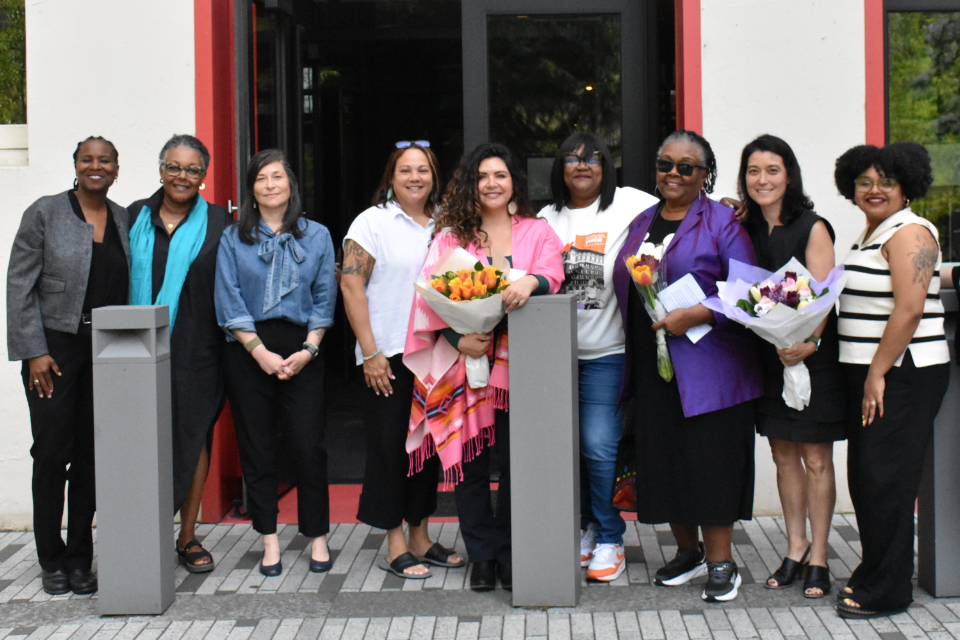
UJJI speakers, YWCA volunteers and staff outside of Town Hall Seattle (left to right): Renee Cogdell-Lewis, Susan Mask, Caedmon Magboo Cahill, Dannie Nemes, Jennyfer Mesa, Jeanice Hardy, LueRachelle Brim Atkins, Tamiko Miyano, and Guadalupe Mabry.
Watch a recording of our Until Justice Just Is event, and sign up for YWCA's monthly newsletter to stay updated on ways to engage in and support YWCA's anti-racism work.
Ana Rodriguez-Knutsen is the Content Specialist for YWCA's Marketing & Editorial team. From fiction writing to advocacy, Ana works with an intersectional mindset to uplift and amplify the voices of underrepresented communities.
We share the stories of our program participants, programs, and staff, as well as news about the agency and what’s happening in our King and Snohomish community.
